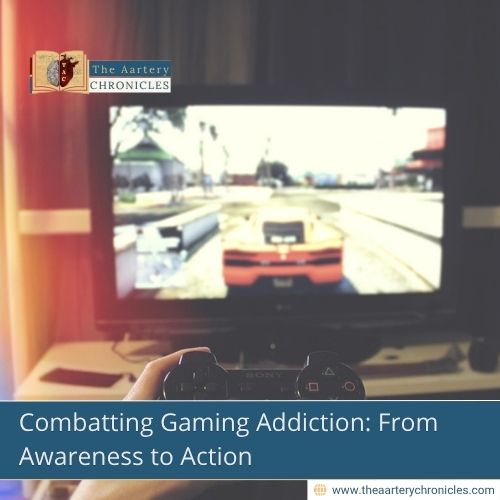

Combatting Gaming Addiction: From Awareness to Action
To play or not to play, that is the question most gamers think. With the advancement of technology, the risks and responsibilities associated with it have also increased. Post the COVID pandemic, everything we do is, in some way or another, associated with an online connection. Be it ordering groceries or essential commodities, tuition classes, hobby classes, cookery classes, educational classes, medical aid, or social media platforms, etc. Humans have become lazy as they have everything they desire at the click/swipe of a button.
It has been estimated that the Indian gaming industry may grow by 28% – 30% annually in 2025; the number of online gamers will increase from 42 crore (in 2022) to 50 crore in 2025! Of the total number of gamers, 71% are from urban India, who play casual or professional games.
In 2019, the World Health Organisation (WHO) has included “gaming disorder” as a behavioural addiction under the International Classification of Diseases, in its 11th revision.
Reasons for the rise in online gaming
Certain factors are responsible for this hike of online gaming leading to addiction.
- Accessible internet: Internet access is not a big deal nowadays. With the popularity of smart phones, tablets, and such devices, the demand for internet connections is on the rise, and it is very accessible.
- Connections: The youth, nowadays, feel socially disconnected and resort to online gaming to improve their mood and stay occupied. Winning a game releases dopamine and they feel good, hence they continue playing.
- Online activity: Since the pandemic, there has been a surge of online activities including social media platforms and gaming. This has increased at an alarming rate and has proved to be habit forming and addictive. The time spent on social media and gaming is alarming. The published data in the Indian Journal of Community Medicine and Public Health 2020, shows that 3.5% Indian adolescents suffer from Internet Gaming Disorder (IGD).
- Family time: There is less time and bonding together for families, owing to the surge of nuclear families in urban cities and working parents. The child often seeks solace in online gaming platforms as a means to pass the time, little realising that this “time pass” will become an addiction.
- Escape: Online games are interesting, and the youth find them a good way to escape from their studies. Unknowingly, they spend most of their study/recreation time playing online games, which they become addicted to.
- Marketing: Certain well-known celebrities are a part of advertising and marketing campaigns for these online gaming platforms. These well-known faces amp up the number of gamers. For all we know, these celebrities may not be playing these online games at all. It’s just about earning money from endorsement for them.
- Peer pressure: Peer pressure among youngsters is another reason for the rise of online gaming. Fear of being ridiculed, left out, criticised, make the youth take up gaming just to prove to their peers that they are not outdated and are in tune with the times, and they seek acceptance from their peers.
Repercussions of online gaming addiction
Online gaming addiction has the following repercussions.
- Behavioral changes: The gamers, if denied access to online games, exhibit behavioral changes like aggression, tantrums, violence, emotional blackmail, threaten to harm themselves, among others. There have been extreme instances of suicide or even murder, if prevented from playing online games. The mental ability and growth is deeply impacted by online gaming addiction. The gamers lie to their family and friends about the time spent gaming. They ignore their responsibilities and only think of gaming.
- Physical symptoms: The gamers are prone to physical symptoms (on account of too much gaming) like migraine, fatigue, neck pain, back ache, eye strain, carpel tunnel syndrome, tired eyes, poor posture.
- Emotional symptoms: The gamers experience emotional symptoms like restlessness, irritability, emotional disconnect from family and friends, mood swings, anger, jealousy, greed, panic attacks, anxiety, suicidal thoughts, depression among others. Game addiction may also lead to mental disorders like ADHD, OCD, Conduct disorder, major depressive disorder.
- Personal hygiene: The gamers spend most of the time(day and night) playing games, that they don’t bathe and clean themselves daily. They are not concerned about their health or hygiene. All they care about is reaching the next level and beating their opponents in the game.
- Lack of focus: The gamers lack concentration and focus and are unable to study. This makes them academically weak. The only focus they show is on their gaming techniques!
- Monetary reward: Many online games lure the gamers with rewards of money. If the gamer wins, he earns, and plays again to win more; if he loses, he plays again to win and recover his loss. This is a never-ending circle. Gamers often resort to stealing or borrowing money to play such games, leading to growing debts. Such debts often lead them to commit suicide or bigger crimes like petty theft, robbery or even murder.
- Isolation: The gamers isolate themselves to play online games. They rarely attend family functions willingly. They prefer to stay aloof and just can’t wait to get back to their room and their game.
- Obesity: Gamers are seated most of the time with no effort to exercise or move from their chair. This causes weight gain and obesity.
Ways to combat online game addiction
- Awareness: Creating awareness about the potential harm and damage caused by the addiction to online gaming.
- De-addiction: Motivating the gamers to participate in de-addiction activities.
- Support: Support by way of communication by family/friends, counselling by certified therapists, Cognitive behavioural therapy (CBT), Group therapy,
- Responsibility of gaming company: The gaming companies should create games that are non-addictive, educative and non-violent. They should avoid misleading advertisements and marketing/promotions.
- Family: The family members should communicate effectively with their children/adolescents and give them time and love. The children/adolescents should fearlessly be able to express themselves/ voice their concerns to their elders. This love and affection will take them away from the imaginary world and into the real world.
- Restricted screen time: The gamers should be permitted restricted screen time for educational purposes only and absolutely no gaming! The elders should monitor the online activities of the children.
All these factors hold true for gamers, who are adults, as well.
Measures taken by some state governments
Some of the State Governments of India have taken proactive measures to curb online gaming addiction among their youth and citizens.
- Digital de-addiction centres have been set up in Kerala, Tamil Nadu and Telangana.
- The Regulating of Gaming ordinance, Meghalaya, seeks licensing for all sorts of games of skill and chance.
- The Kerala State Government issued a notification in 2021, making playing online rummy with stakes illegal.
- The Tamil Nadu State Government, based on the recommendations of the K. Chandru Committee, passed the Prohibition of Online Gambling and Regulation of Online Games Ordinance, 2022.
In the earlier years, before computers were introduced, games were meant for recreation only. These were games, played by the children, like ‘hide and seek, ‘catching catch’, ‘chain–chain’, cricket, football, badminton, tennis, and a host of others. There was a playtime in the evening, during which the children played with their friends, and thereafter went home to study. Children were encouraged to learn music, fine arts, i.e. dancing/drawing/sketching/ painting/ craft work/ needlework, theatre, read books, take part in sports/cycling, etc.
Cut to the present, where the only games played are online!
Let us discourage the demon of online gaming addiction from taking over our lives. We are not meant to be lost in an artificial world. Humans are intelligent and capable of much more than whiling away their time in front of a digital screen.
Say no to online game addiction and yes to life with all its beautiful moments.









